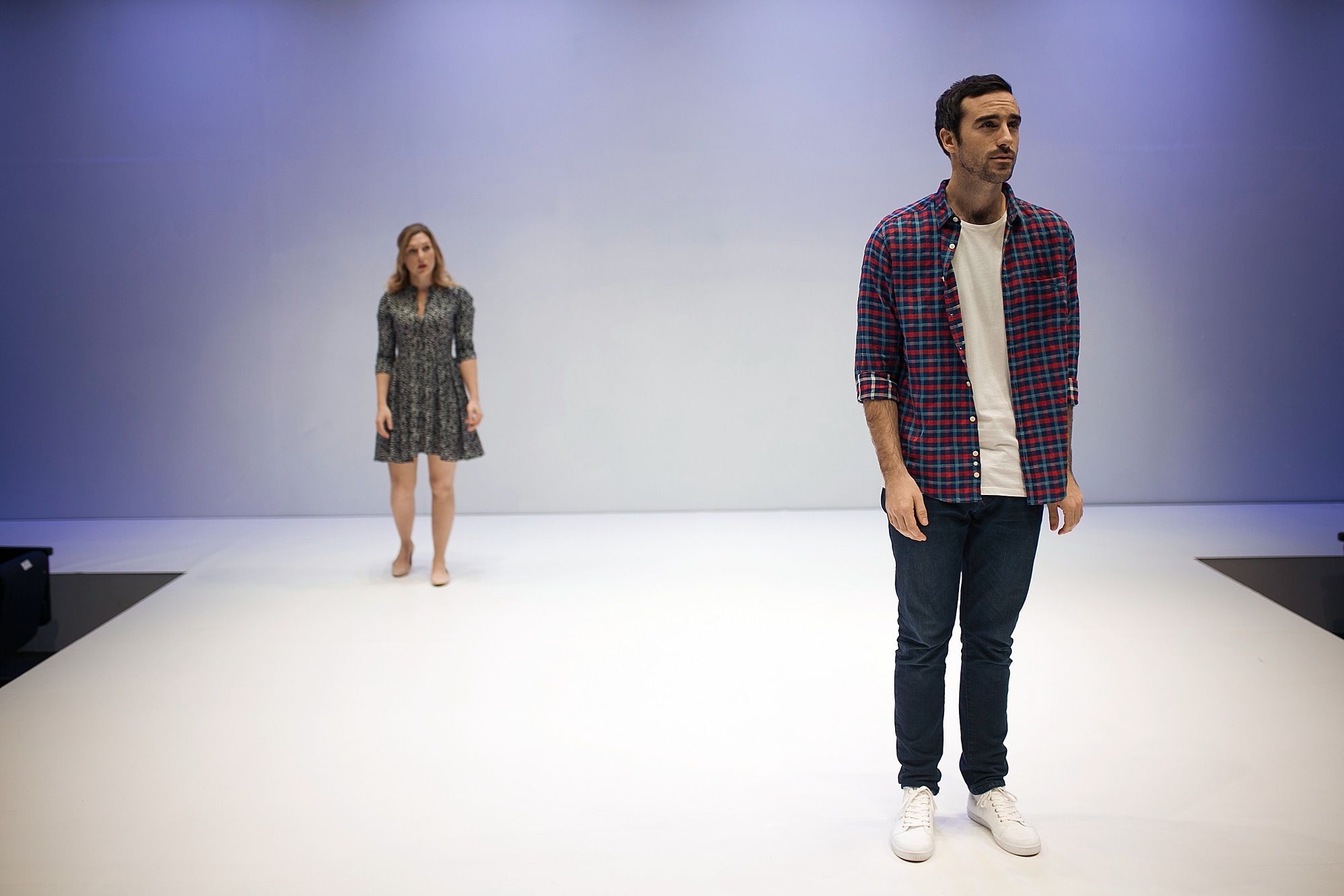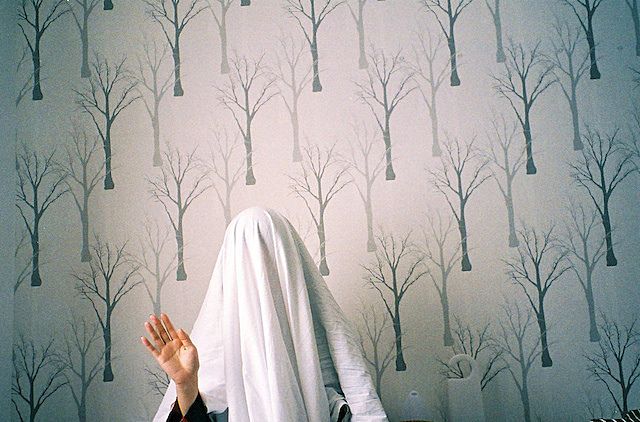An Impossible Sexuality: With or Without Cock
Jess Holly Bates on Mike Bartlett’s play Cock, sexual erasure and the problematic way we talk about bisexuality. Contains some spoilers.
Jess Holly Bates on Mike Bartlett’s play Cock, sexual erasure and the problematic way we talk about bisexuality.
Note: this essay contains some spoilers.
John is a guy in a toxic relationship. Correction: John is a guy in a toxic gay relationship. We meet him and his partner, ‘M’, in the bickering no-mans-land of an impending breakup. They are “nearly over” – crunching on eggshells each time they speak. But seven years is no small investment. It’s hard to walk away. Nevertheless, John is brave. He leaves. If that were the whole story, it might be a poignant tale of letting go. As it stands, John finds himself back on the doorstep of his lover, conciliatory teddy bear in hand, confessing he has slept with a woman and is now facing the dissolution of his sexual identity. And so playwright Mike Bartlett sets the scene for his bittersweet comedy, Cock – with John finding his way out of a massive cultural pothole. John is morbidly, morbidly confused.
And who could blame him? In a post-Stonewall society, where liberal Western democracies have been sipping on the LGBTIQA+ Kool-Aid for almost five decades, the coming out narrative has now entered our cultural bloodstream. We know the story well: from repression to liberation. It might be tragic (one chooses to stay silent) or heroic (one chooses to become their true self). As beautifully parodied by the makers of South Park, the mention of Caitlyn Jenner (for example) can only yield two words in response: ‘So. Brave.’ In Cock, we meet John on the other side of his ‘brave’ moment:
When I finally decided I’d do it and come out, all these people hugged me and were proud of me and said how brave I was and suddenly people were touching me and I was wearing different clothes and I was part of a scene, even walking differently I think and everyone said the real me was emerging, that I’d been repressed… but it didn’t feel like that to me.
John’s reluctance to buy into this ‘coming out’ as the zenith of his authenticity jars with the cultural processing mechanisms we have for gay stories. We don’t have strong examples for ‘going back into’ the closet, and if John willingly leaves ‘M’ for his other female lover, ‘W’, can we equally celebrate his sexual awakening as a ‘real’ ‘emerging’ heterosexuality?
Cock flirts with, but never affirms, a third proposition – that John is neither heterosexual, nor homosexual, but something else entirely. What if his desires represent that elusive sexual quantity: the bisexual? Fondly referred to by academic Carolyn Pajor as “the white trash of the gay world”, bisexuals are a cultural blind spot in the fervent gay empowerment rhetoric of the 1970s, a grouping that has become “socially acceptable not to accept”. The insults hurled at John in Cock are a glittering illustration of the social allergy to bisexual expression. He is “a collection of things that don’t amount… a sprawl, a mob.”
The term ‘bisexual’ – from its etymology – describes an incomplete stage of evolutionary development, and this pejorative tone continues today. Unlike its gay or straight alternatives, bisexuality is represented as a state of transition between sexualities; it is inherently unstable. Consider the well-worn trope of the girl returning to date men after her experimental college years, or the hetero-married man who fucks boys in bathrooms. If the first is an attention-seeking ‘phase,’ then the second is simply a tale of homosexual repression – he is still (of course, sadly) ‘in the closet’. The validity of the bisexual option is always displaced.
The fate of John’s bisexual impossibility is further sealed by the unspoken contract of monogamous coupling. John cannot have both: he must choose one. And he is not merely choosing between two lovers, but two sexual identities. The two lovers are never named, only referenced in the text under a parodied binary of ‘M’ for man and ‘W’ for woman. If coupling is a necessity, then either choice has a modicum of invisibility for John – if he goes with one lover, he will be assumed heterosexual. If he stays with another, he will remain – visibly – homosexual. He is literally sitting on the fence of a homo/hetero binary invented in the nineteenth century, and the ensuing indecision and anxiety that colours much of the play’s (in)action could be empathetically viewed as a direct result of this fact. Theorising the invisibility of this discourse, however, does not help John’s ‘fence-sitting’ plight. A more empathetic, bi-positive reading of John’s predicament would argue he is not sitting on the fence, but rather that history’s fence has been built on top of him.
If authentic representation is our yardstick, contemporary bisexual offerings are poor.
The existence of this ‘fence’ has yielded vast political advances for the LGBTIQA+ movement, albeit disproportionately skewed toward the needs of the ‘L’s and the ‘G’s. At one point, John’s female lover calls him “a picture drawn with a pencil” who “ha[sn’t] been coloured in.” Like the half-finished rainbow of LGBTIQA+ politics, John might exist in one of those faintly-coloured-in communities still awaiting their empowered Ellen moment. If authentic representation is our yardstick, contemporary bisexual offerings are poor – Katy Perry’s insistence that she kissed a girl, and she liked it rides tandem to Orange is the New Black’s hypersexualised bi-protagonist Piper Chapman to shore up an accessible (and part-time) girl-on-girl wet dream for the male gaze. Examples of male bisexual heroes are even more scant, not least because the gay male rights movement is fundamentally threatened by bisexual practice. Through ‘M,’ Cock is a beautiful articulation of the palpable threat that John’s shifting sexuality poses not only to their relationship, but to the liberated homosexual plight in general:
[Gays only have] some rights, not enough and they’re under attack all the time and not properly defended in this country/even without people like you
‘M’’s animosity lies in his strategic impulse. Effective political mobilisation of the gay rights movement relies on what lawyers call the immutability defense: one ‘does not choose’ to be gay. By contrast, bisexual identity is defined by a right to choose between genders, and thus the ‘flight risk’ of homosexual men is a real problem for the stability of gay identity. Because of “people like [John]”, being ‘gay’ is more difficult to prove, and the campaign for equal opportunities is necessarily weakened. The gay reliance on immutability, then, is a reliance on bisexual erasure. Similar ‘dilution’ rhetoric populates sectors of the lesbian community, where lesbianism is coded as the expression of a sex separatist society. Out rolls the old adage ‘if feminism is the theory, lesbianism is the practice.’ The bar for political allegiance is set at the genitals of one’s lover. By this frame, to enjoy (even part-time) heterosexual privilege forecloses the possibility of effectively resisting the patriarchy.
John’s response to this double discrimination feels indelibly queer. He chafes at the very act of labelling itself, at the “horrible horrible words” that conspire to pin down his personhood through sexual definition. His battle cry is one that boils identity down to banal idiosyncrasies rather than gendered ‘opposites’:
Why are you telling me I have to know what I am? It doesn’t matter, I love him because he makes me toast in bed and he’s scared of clingfilm. I love her because she makes me feel as old as I really am. She’s gentle.
John’s resistance to being classified, however hip and ‘fluid’, also becomes the play’s narrative brake pad – and such circular indecision in a protagonist can bring an audience to its knees. Playwright Mike Bartlett is fond of referring to John as ‘annoying’ – and this seems to buttress a contemporary impatience for the bisexual ‘coming-out’ narrative. When I told my cousin I was writing an essay on bisexual invisibility, she replied “Yeah, but isn’t everyone bisexual?” Our generation was raised with an acceptance of the underlying spectrum beneath the lived binary – an idea we can trace back to mid-20th century sexual researcher Alfred Kinsey. In theory, this sounds very postmodern and ‘queer,’ but it is just that – theory, and its ambivalence moves to erase bi-stories just as readily as recent psychological studies which question bisexual existence at all. Indeed, something in the bored quality of my cousin’s tone hit the nail on the head. It felt like trying to point out that Santa isn’t real. Like, we all know that’s really how sexuality works, but in practice, we have to pretend that people only like one kind of thing. Because that’s what we do – so don’t spoil the magic. The ambivalence masks a veiled defense mechanism: don’t dismantle my tropes of sexual belonging. Or at least, not yet. It is a sexuality we relegate to some utopian future where labels will be redundant altogether. As bisexual researcher Steven Angelides has noted, “bisexuality is not allowed to exist in the present tense.” In practice, the result is that bisexual identity enjoys none of the heroic ‘arrival’ rhetoric of gay, lesbian and to a lesser extent, trans identity.
Bisexual identity enjoys none of the heroic ‘arrival’ rhetoric of gay, lesbian and to a lesser extent, trans identity.
Reading Cock through bi-goggles is a very particular act of hermeneutics – because under interrogation, Cock is no bisexual manifesto – but since representations are so culturally scarce, the text cannot help but position itself within the conversation. Perhaps the way Cock refuses definition is the only survival mechanism that the heavily flattened bi-story has available. By giving us John, whose vacillating uncertainties Bartlett has compared to Hamlet, Cock breathes life into the complicated condition of social definition, without pretending to know the way out. The showdown of John’s decision in Act III is written as a dinner party farce, a scene played out by a set of time-based rules: four guests will sit for an awkward dinner, two bitter courses will be served, and a decision must be made. A matrix of etiquette ensues, where everything happens and yet nothing is changed.
The essence of comedy is the creation of disruptive action that offers a window to alternative ways of being, which ultimately resolves in such a way as to reinstate the status quo. The form is a fitting vehicle for pricking at the difficulty of using outmoded binaries to describe belonging. Even John knows they are trapped inside a form. “This is a farce now... now it’s parents and tarts and vicars” – and yet, on moves the play. John resolves the action by choosing to change nothing, the path of least resistance, and so we return to a bickering pair of homosexuals. It’s an unsettling picture of our ambivalence to alternative sexual configurations; refusing the fluid possibilities that might loosen our cultural grip on ideas that no longer serve us.
Cock runs from July 20 - August 12 at the Herald Theatre. Tickets available here.
This piece also appears in the show programme and has been produced as part of a partnership between The Pantograph Punch and Silo Theatre and is supported by Auckland Live, co-presenters of Cock.



